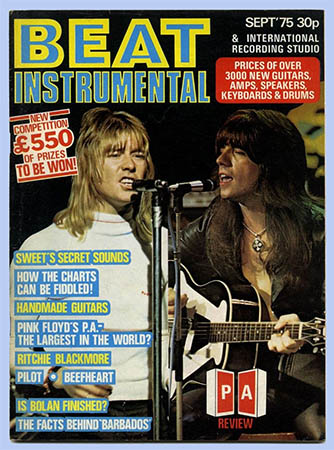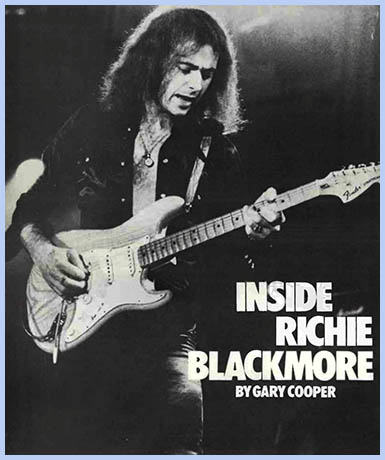|
Ritchie Blackmore Inside Richie Blackmore  Since we lost Jimmy Hendrix, Ritchie Blackmore has worn the crown of the king of flash guitar. Where Page, Beck, Clapton and others have lapsed into laid-back mini solos Blackmore has kept up the pressure, pushing his Stratocasters further and further. Working hard to make his guitar speak until he stands almost alone as one of the few people who can take a guitar solo and make it more than a technical exercise or a pleasant tune.
Since we lost Jimmy Hendrix, Ritchie Blackmore has worn the crown of the king of flash guitar. Where Page, Beck, Clapton and others have lapsed into laid-back mini solos Blackmore has kept up the pressure, pushing his Stratocasters further and further. Working hard to make his guitar speak until he stands almost alone as one of the few people who can take a guitar solo and make it more than a technical exercise or a pleasant tune.But Ritchie has split from peen Purple. Left his home ground and is now on the road with Rainbow, his new outfit comprising American Ronnie Dio on vocals, Jimmy Bain, bass, Gary Driscoll, drums and Micky Lee Soule on keyboards. I'd been warned beforehand to watch his knack of making interviewers feel ill at ease. It's true. If you let him get away with it. Ritchie will manage to convince you that he is thoroughly bored with interviews, doesn't really like anything and is generally pissed-off with everything. Watch, however, for the sly laugh, the sudden wolf-like grin and the dry humour, and you'll realise that he's simply adding to his reputation for being difficult - and having a laugh about it. At that stage you can either laugh with him or crawl off and write a heavy. "let's knock Ritchie" piece (viz. some other interviews of late) because he's tried to put one over on you. Nothing changed To start with, we launched off straight into the subject of gear. Nothing much seems to have changed but, here, for the record, is what lies behind Ritchie's sound in terms of gear. O.K., here's the first killer. All of his Strats have grooves sanded away between the frets! This is no slight dip, but a heavily worked valley to enable him to pull more leverage out of the string when he's bending a note. It's not a technique that one could recommend to anyone else. Quite simply, you'd have to go used to a whole new way of playing. Why, though, had Ritchie stayed so faithful to his beloved Stratocaster? "Strats have so much more bite and they've got a clean sound," he whispers, "I like a distortion that comes from the amp, where I can control it, not from the pick-up where I can't. Strats cut through a lot. The actual guitar is far harder to play than a Gibson but it's more rewarding because with all that clarity you hear your mistakes a lot more." Of course, the guitar alone won't give the exact Blackmore sound, a lot has to do with the fact that he spent about eight years practising for six hours a day! The third factor in the Blackmore saga is, of course, amplification, as Ritchie explained. "I always use Marshall, but I go to the factory and get them power boosted by about a million watts. I also have an extra output stage built on which gives me more treble and I have the bass taken right out. When actually playing. I then turn the treble right down and get my distortion through overloading the speakers." There are no pedal effects in the Blackmore sound, for reasons which he explained. "I think that the more effects you use the less you can concentrate on your playing. I do use echo though." Ritchie's echo unit is, in fact, a tape recorder which he converted to perform two functions. One is to act as a pre-amp to overload the input stage of his Marshall, the other is to work as a tape echo unit. Having what is perhaps best politely described as an 'extravagene' style of playing, Ritchie is forced to spend a fair amount of time tuning up between numbers, although the very individuality of his technique does, to an extent, solve the problems it creates. "I do have to tune-up before every number and there are a couple of numbers where I'm playing in fifths and fourths where I have to spend two or three minutes tuning before I can play them. But, I never play whole chords - I use triads most of the time so that if, for example, I find that my top E is out I can compensate for it." Ritchie's choice of strings is a familiar one to many players "I use Picato which I've used for about six years. Clapton told me about them and they have a really good sound, every American guitarist I know is trying to get them because they have some really horrible things over there." Blackmore's style, as I've already said, is very highly distinctive. That came about through an early decision which was assisted by advice from ace guitarist (and sometime Blackmore tutor) Jim Sullivan. "If I do listen to somebody. I'll listen to them and then go my own way. I tried in the beginning, to copy people like Scotty Moore and James Burton but a lot of the solos were too hard and so I made up my own. Everybody has their own way of playing and you should only really play in that one style - that's what Jimmy Sullivan told me."  Blackmore talks very slowly and extremely quietly - giving the impression that if you put him on a stage he'd just fall asleep or lean back again his stack and doze off. The fact is that he's a bit of a maniac on stage with an axe in his hands and one supposes that it's his way of compensating for being so dry off it.
Blackmore talks very slowly and extremely quietly - giving the impression that if you put him on a stage he'd just fall asleep or lean back again his stack and doze off. The fact is that he's a bit of a maniac on stage with an axe in his hands and one supposes that it's his way of compensating for being so dry off it.Another odd factor in Blackmore's make-up is his own taste in listening. Having a fond love of Germany and things German, he's very much into Baroque music, regarding Bach as God. "Baroque music is very rhythmical and very direct and I find it particularly stimulating. With rock music. unless it's very well played, it's just a headache because it's too sloppy." On the subject of the current state of rock, Blackmore is refreshingly adamant. "In England everything is so bad. Radio One is out of the question and only the odd show like the Alan Freeman show is worth listening to." Of the current bands, Ritchie seems to be impressed with Tangerine Dream and Kraftwerk (back to his love of things German here) but remains unimpressed with the general state or rock music. "I think of England in a patriotic way and I love Germany but it's got rather silly over here where people will do anything to get a hit. I don't know quite who's doing it but there's some fat producer who's ****ing the whole thing up somewhere. What happened to the Ready Steady Go's and the Oh Boy's? In America you see all the new groups on television but here, all we've got is The Old Grey Whistle Test which is crap. That bit in the middle where some guy sits on a stool and drags out a dirge. Aside of the fact that Blackmore's words happen to coincide exactly with my own thoughts on the subject, it is totally refreshing to meet somebody who is convinced that the state of Britain's rock media couldn't be worse. It's no coincidence that the weekly papers recently went for him, because they have no bigger critic of their intellectual pretentiousness than Ritchie Blackmore. That, I feel compelled to add, is fine by me. What they failed to see from their towering heights is that Ritchie can play the guitar like few others on this planet, the kids love his heaviness but the press can't get into it. For them the fashionable obsession with funk and laid-back music is more important than musical content and they feel hurt when a musician points out to them that they have become more concerned with self-created fashion than with what people want to hear and want to play, dubbing his music as old-fashioned. Final decision Which brings us to Ritchie's split with Purple. The final decision to break from the band came about before he embarked on his solo album. During the recording of it, however, it became obvious to him that, perhaps for the first time in his career for many a moon, he had begun to enjoy himself in the studio. As a result of that, the decision to split crystalised into a decision to form a band and get out of the rut which he felt that Purple had got into. Which leaves us with the Rainbow album itself. Ritchie claims that a lot of his inspiration came about from the medieval music that he has been listening to lately with the censequence that he has found himself using modes rather than scales as the basis of some of his recent work. The new band promises to be a killer and Ritchie Blackmore seems to be ready to get back to the brashness which he says is missing from his later work with Purple. Another bogey lies dead as I leave the Holiday Inn. Blackmore has turned out to be a very human being, not at all adverse to talking about his style, his views or anything else under the sun once you've pointed out that you are prepared not to use him as a stone to grind your own anti-rock axe against. © Gary Cooper, Beat Instrumental - September 1975 |